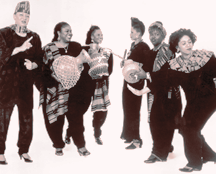A capella singers draw the honey out of the African American musical legacyBy Nicky Baxter
Freedom Singers: Sweet Honey in the Rock draws on a constellation of black musical forms.FOR MANY, THE EARLY 1970s spelled the demise of the civil rights and African Liberation movements in the United States, with the Bakke decision providing the official stamp of mainstream disapproval. Yet that same period witnessed the rise of a Washington, D.C.-based a capella unit whose style harked back to the early days of the Martin Luther King-inspired Freedom Riders and marchers who drew on the black gospel tradition to muster the courage to endure the virulent invective and terrorist tactics of Southern white nationalists.
Founded by activist/singer Bernice Johnson Reagon in 1973 as an offshoot of her vocal workshop group--itself part of the then-influential DC Black Repertory Company--Sweet Honey in the Rock evolved into a genre unto itself. No other ensemble has so successfully distilled the essence of the musical legacy of the African in America. Though firmly grounded in spirituality, the six women of Sweet Honey also draw on a constellation of black musical forms, from sacred songs and gospel, to blues, R&B, jazz, black pop, reggae, calypso and, inevitably, music from the Motherland. And whether by chance or design, the sextet has also developed stylistic innovations which blithely elude known labels.
Last summer, Sweet Honey sojourned to South America--Brazil, to be precise--and then to Haiti, both firsts for the group. Quizzing founding member Carol Maillard about their travels beyond U.S. borders, she seems a bit blasé about the experience. Maillard attributes her somewhat muted response to the dizzying brevity of the visits. Was she at all surprised at the audiences' reportedly rapturous response? "Well," she begins, "We'd never been there and, of course, we were hoping to be received well. And we were. But then, that's been the case wherever we've performed."
The Philadelphia native says this without the merest suggestion of conceit; it is, for her, simply a statement of fact, satisfying as it is. Indeed, her warm and confiding voice has no room for boastful chest-beating.
Though the group happened to be the Haiti's first visiting international act, Maillard, who now resides in New York with her teenage son, emphasizes that this is mere coincidence: Sweet Honey was there as part of a benefit performance for the University of Haiti. "Just observing during our very brief stay, we got a real sense of indomitable spirit the people there have," she comments.
Turning our attention to Sweet Honey in the Rock's recently released Sacred Ground (EarthBeat!/Warner), a breathtakingly beautiful collection of traditional and original sacred songs, one is somewhat surprised at its thematic unity. More often than not, the sextet's past albums tended to rove the topical map, touching on issues of racism, gender politics, class contradictions and community activism, all conveyed with a sense of indomitable optimism. Of the group's path to Sacred Ground, Maillard maintains that there was no grand design in mind. "We don't have a rigid set of rules [for recording]. It's mostly based on who has the most creative energy."
Maillard, who in her spare time has acted in a number of Broadway and off-Broadway productions, confides that the singing troupe didn't know whether the sessions that produced Sacred Ground "were going to be two distinct albums covering a lot of topics" or focus on the sacred, spiritual realm. "It fell into its own rhythm and we kind of went with it; we're really pleased with the results."
As well they should be. Sacred Ground may be about doing the Lord's will, but these six women make plain that there's a multitude of stylistic paths to achieve that goal. The material ranges from the ante-bellum slave metaphysics of "Jordan River" to the post-bellum declaration of independence in "No More Auction Blocks"; from the good-time gospel fervor of "Jesus Is All" and the sweet street-corner soul of "Inner Voices" to the airy, jazz-buffed vocal arrangement of "Prayer to the One." Throughout, the Sweet Honey singers perform like God's own gospel choir, brimming with intricate and immaculate harmonies and enough catchy melodies to make current pop sound like hackneyed pap.
COUNTERING preconceptions of pundits who dismiss the vocal unit as just another outdated a capella sorority, Maillard maintains that "the thing about Sweet Honey is that people often think we play one style. But we do many things, stylistically. We do a really wide range of things if you listen to our albums back to back."
With Sacred Ground, Maillard says, "everybody was filled with the spirit of God, with the spirit of 'do unto others ... ,' with listening to your inner voice." She cites as an example her contribution to the album, "Prayer to the One," which, she says, is "about not seeing differences between one's self and God. God manifests in so many ways--there's no way you can look and not find Him. He's as close as your breath."
With respect to the group's artistic development, Maillard sees it as a natural evolution. "Sweet Honey has always been about basic humanity. Building a sense of community. We're bridge-builders." They extend that concept with Singing for Freedom: A Concert for the Child in Each of Us, a newly released live performance videotaped at San Francisco's Glide Memorial Church. Considering that, under the stewardship of the Rev. Cecil Williams, Glide has since its earliest days been on the cutting edge of social and religious change, the venue was the perfect site to make the video. Released on Music for Little People, Singing for Freedom culls selections from Sweet Honey's two award-winning children's recordings, All for Freedom and I Got Shoes (both Music for Little People productions).
Issued just under two years ago, the latter album is rather like Sweet Honey on an Africanized (and multicultural) Sesame Street corner kickin' it with the kids. It features a young people's chorale singing tunes like "Run Molly Run" and spoken interludes that could cause multiculti zealots to weep for joy. ("Let's count to 12 in ... Japanese!) As with past efforts, this endearing flight of fancy is sprinkled with bits meant to bolster black pride even as it reaches out to others.
Eschewing the lure of the pop world's fame, flash and suitcases of quick cash, these women sing for love, not money. Not that they don't enjoy getting paid; it's just that money is not their god. Ultimately, their music is for the real-world rainbow community. In a musical universe polluted by pampered packs of brats indifferent to anything that exists outside of their cloistered and oh-so comfy bubble, a taste of Sweet Honey in the Rock is a welcome treat, indeed.
Sweet Honey in the Rock appears Jan. 25 in a fundraiser for the Santa Cruz Waldorf School Multicultural Scholarship Fundraiser at the SC Civic Auditorium. (479-1521)
[ Metro Santa Cruz | MetroActive Central | Archives ]
From the January 18-24, 1996 issue of Metro.
© 1996 Metro Publishing Inc., San Jose, CA. All rights reserved. Reproduction
or retransmission in any form prohibited without publisher's written permission.
This page was designed and created by the Boulevards team.
Copyright © 1996 Metro Publishing and Virtual Valley, Inc.

